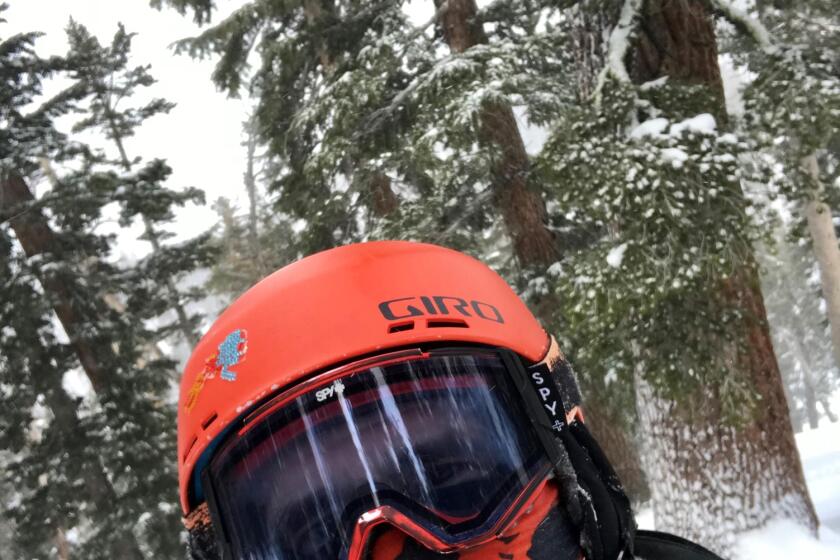- Share via
Dick Schulze, 76, didn’t take up snowboarding until his early 50s. Since then, he has competed in amateur and professional events around the world, including the 2006 Olympic qualifiers, in which he competed against Shaun White.
- Share via
TRUCKEE, Calif. — Up he goes, toward the blue sky, scaling the bank of snow before a hop and quick pivot sends him sailing back down again.
Down he glides, across the slope like a knife smoothing butter on toast, before pinwheeling through a series of small turns.
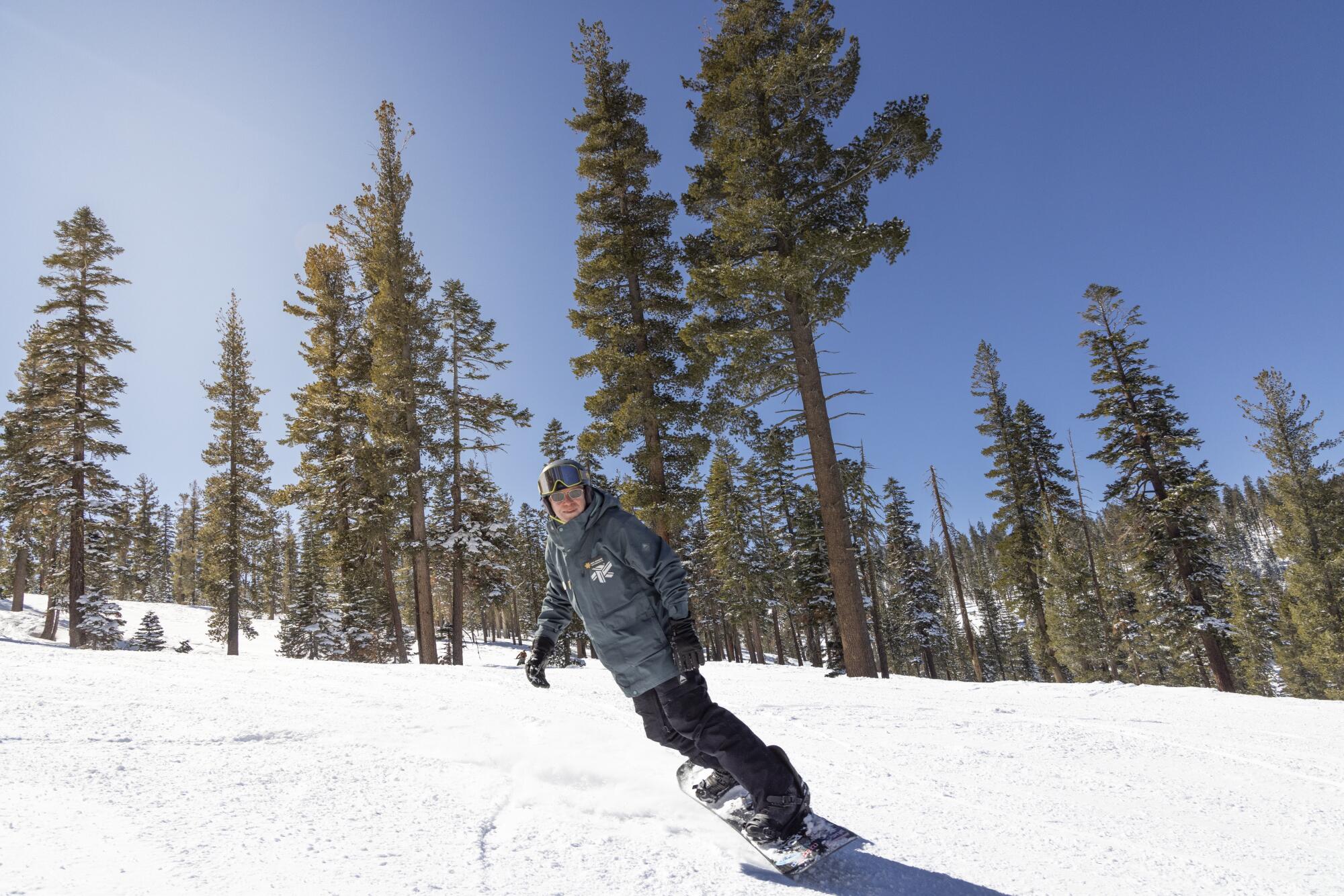
You can have your Shaun White, your Lindsey Jacobellis, your Chloe Kim. Sure, they’re Olympic gold medalists and, in White’s case, a snowboarding legend.
But they’re kids — even the 35-year-old White — compared with Dick Schulze who, at age 76, defies both age and gravity.
He is the country’s oldest competitive snowboarder, a relative late bloomer who didn’t take up the sport until his 50s and plans, despite a titanium knee and a fall that crumpled his helmet and blacked him out, to keep going until he hits at least 100.
Because the combination of speed and agility — the sensation of skimming through a giant bowl of whipped cream, of hurtling forward like the brakes have gone out, of moving with the fluid ease of quicksilver — thrills him in ways he can’t describe.
Unlike when he navigates a field of moguls (those are bumps and deep indentations in the snow) or flies down a black diamond run (those are steep inclines, sometime dotted with moguls), Schulze struggles to explain his passion and obsession.
“There’s something very sensual about the way a snowboard moves,” he finally said after grasping for the words. “That’s about the only answer I can really give.”
::
Americans are living longer and generally leading healthier and more active lives.
The Winter Olympics saw an usually large number of competitors in their 30s and 40s, a relatively ripe age for world-class athletes. “Don’t count the old girl out,” Jacobellis said after capturing the country’s first gold medal in Beijing, in the snowboard cross race. At 36, she is four decades younger than Schulze.
There are several reasons for the rise of autumnal athleticism, said Jennifer Ailshire, an associate professor of gerontology at USC. Better diet. Better training and physical conditioning. Less exposure to disease. (Notwithstanding the current pandemic.)
“Our conditions of living have improved,” said Ailshire. “We’re less likely to have accidents and injuries than in the past. Our world is a healthier, safer world than it used to be.
“In terms of the world of athletics,” she went on, “exercise science and the science behind competition have also improved over time, so that athletes just have more longevity than they’ve ever had before.”
Maybe Schulze snowboarding to the century mark isn’t that farfetched. The home page of the National Senior Games Assn., which organizes events for athletes 50 and older, recently featured a 97-year-old swimmer, a 96-year-old track and field competitor, a 95-year-old cyclist and a triathlete who, at age 55, is a mere sprout.
The organization, which requires athletes to qualify for its biannual competition — rather than simply pay to enter — offers medals in 22 sports, but none involving ice or snow. Those drew a limited number of contestants, mostly from mountainous states, and weren’t financially viable, said the group’s spokesman, Del Moon.
“We’re not the Olympics,” with multinational corporate sponsors, Moon said from the group’s headquarters in Clearwater, Fla. “We don’t get Coca-Cola, we don’t get Bank of America, we don’t get Chevrolet.”
Another important reason for the growing ranks of senior athletes is a shift in the mindset of older Americans, who no longer see aging as a sadly inevitable slide into decline and decrepitude.
“It helps that older adults know that they can be in spaces that weren’t traditionally considered spaces for older adults, like competitive sports,” said Ailshire. “Then it becomes something to aspire to, like, I want to be like the older lady who can run farther and faster than I can, even though I’m much younger.”
Schulze wouldn’t disagree with the whole mind over body thing.
Once you get the hang of it, he said — once you push past the aches and beginner bruises, overcome the fear of heights and occasional panic over losing control, once you grow comfortable standing sideways and sliding down a mountain with 10 or so pounds of fiberglass strapped to your feet — then snowboarding is 90% mental.
That is, simply having the confidence to go for it.
::
Schulze used to be a slug.
Growing up in Riverside and then Carlsbad, he was the kind of kid who had to be forced by his parents to pick a sport, any sport, to get him outdoors. He chose soccer, along with other kids who didn’t like or weren’t good enough to play football.
Schulze ice skated while attending MIT, where he studied electrical engineering. He got his law degree at the University of Chicago, following his father’s career path, and played some racquetball while serving in the Air Force. But for several years after that Schulze did nothing terribly physical. He practiced intellectual property law, enjoyed rich desserts and kept “getting fatter.”
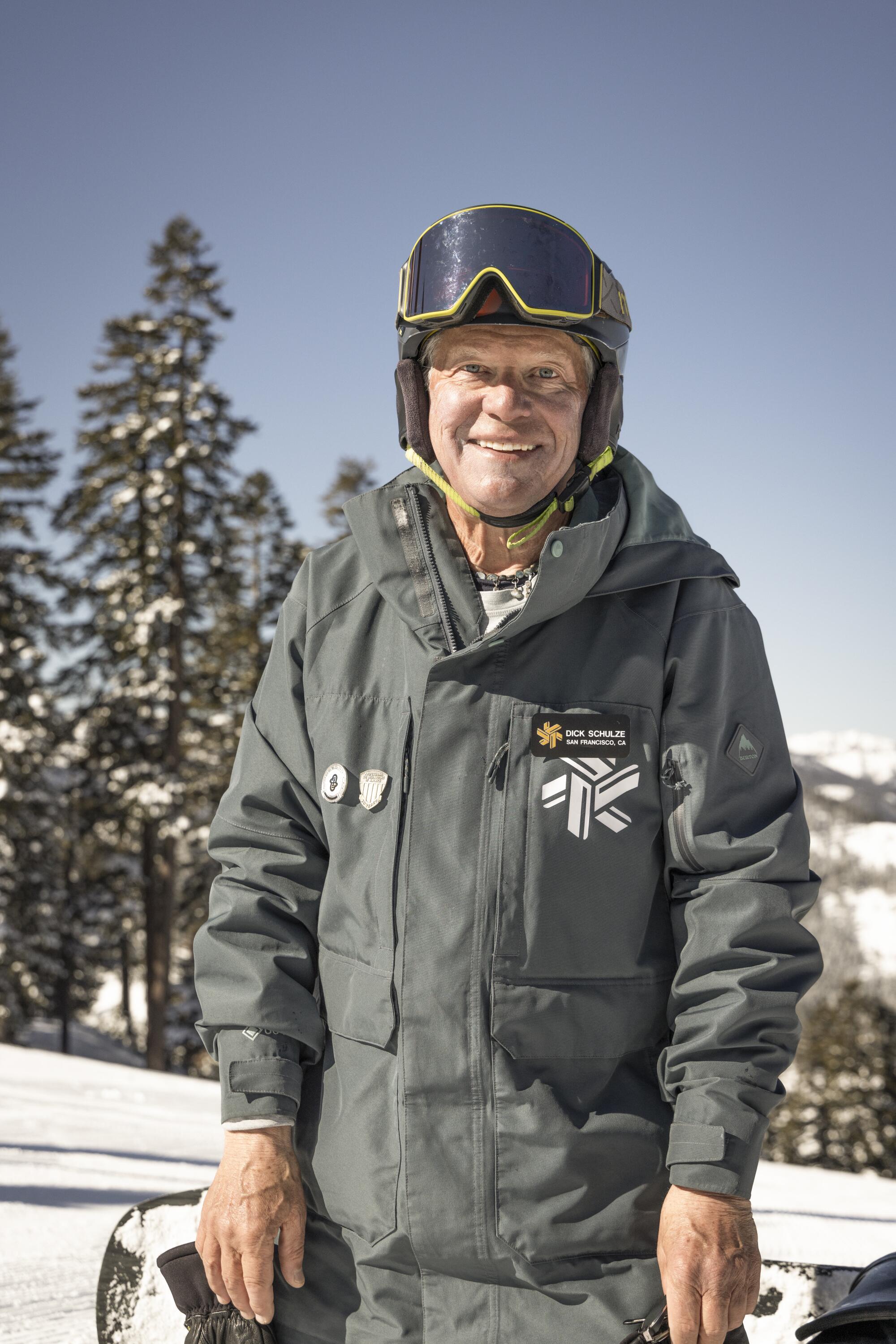
Today, Schulze is tall and lean, like a stick of jerky. Back then, he carried 259 pounds on a 6-foot frame. After a particularly embarrassing weigh-in for Air Force Reserve duty — he just barely qualified — Schulze resolved to get fit. He improved his diet. He started running.
About that time, Schulze’s son begged him to go skiing. They tried it a few times and Schulze hated it. The big crowds at Southern California’s Snow Valley and Snow Summit resorts were terrible. The snow wasn’t great and the runs weren’t very long.
The chairlift, which conveys skiers high in the air, was the worst. Schulze couldn’t shake the fear he might slip beneath its thin protective bar and plummet to earth. “At the time, if I got more than two feet above the ground on a ladder, my knees would start to shake,” Schulze said over beer and a post-snowboarding plate of carnitas. “To get on the chair was absolute torture.”
He got over his phobia and, on a business-trip whim, decided to visit one of Colorado’s sprawling ski resorts. It was 1990. The Denver Broncos happened to be playing in the Super Bowl that weekend, and so Schulze practically had the slopes to himself. That’s when he lost his heart to the sport. Schulze and his son were soon traveling throughout North America, becoming expert skiers.
His goal is riding until he’s 100. I plan to hit 120.
“We skied together all over the American West,” he said. “Then Whistler in Canada and La Grave in France.”
By then, snowboarding, which started in the 1960s as skiing’s eccentric cousin, had taken off. Many of its practitioners were young, rough and rowdy. Out of curiosity, Schulze decided to take a lesson at a resort in Utah’s Wasatch Mountains. Half a day, he figured, then back on skis.
He stood on a hill about 3 feet high, just outside the lodge. He strapped one foot to the board. Nothing. He strapped in the other foot. Nothing. “Finally I got most of the board pointed down and slid to the bottom,” he recalled. “And that was all it took.”
Schulze was about to turn 52. It’s no exaggeration to say the moment changed his life.
By then he was living in Palo Alto. He began driving just about every weekend he could to snowboard at the resorts around Lake Tahoe. When those shut down in early spring, he piloted his small plane to Mammoth Mountain, where the slopes stayed open until June or later. Then, “I was really pretty unhappy because I thought it was going to be several months before the snow would come to Tahoe again.”
So on he went to New Zealand — flying commercial — where wintertime corresponds with summer in the U.S.
It helped that Schulze was single, following an amicable divorce, and, most especially, that he was handsomely compensated as a managing attorney for Hewlett-Packard and then, after a corporate spinoff, Agilent Technologies. (The vanity plate on his slush-streaked SUV reads “YFIPA,” which stands for Your Friendly Intellectual Property Attorney.)
In 2007, Schulze moved full-time to Truckee, just a few miles from the Northstar ski resort. He practices law part-time with a Reno firm, but is winding down toward retirement. Most of his hours are spent giving ski and snowboarding lessons at Northstar and traveling the country to vie in a dozen or so competitions a year.
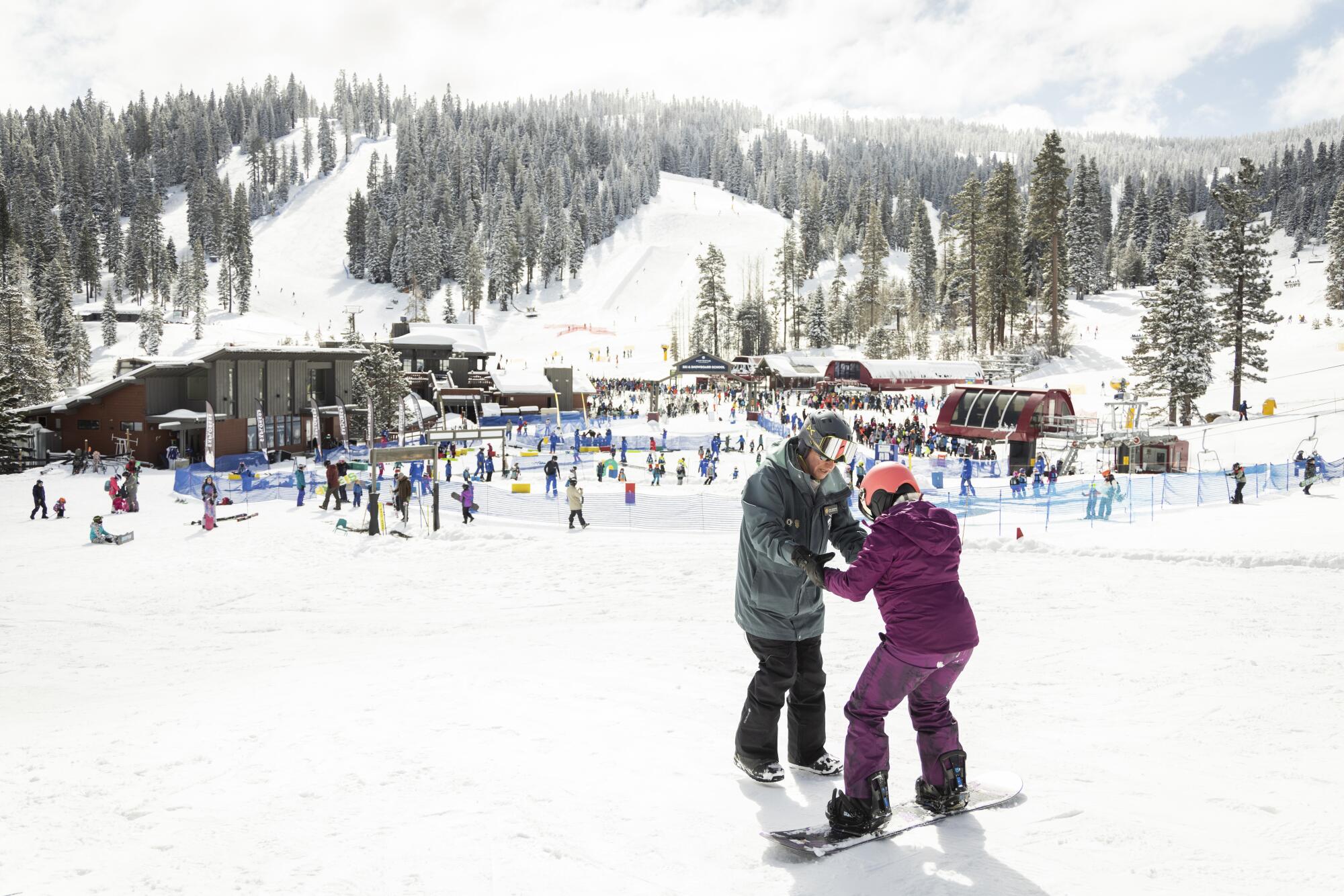
Home is an unpretentious A-frame, about three miles above Truckee’s main drag, with a distinctly college-dorm vibe. More than a half-dozen snowboards hang in the entryway over a cubbyhole stuffed with boots. The walls are covered with snowboarding posters and memorabilia from Schulze’s wintry travels.
The den, where he does yoga and practices footwork on a small training board, is lined with plaques and medals. The barest room is the kitchen; Schulze rarely cooks.
He shares the space with Hugo — a rambunctious shepherd-mastiff mix — and one of Schulze’s six grandchildren, 22-year-old Dominic, who helps manage one of the ski shops in town. “He still rips,” Dominic said of his grandfather, and Schulze does, regularly hitting 35 to 40 mph on the steep runs he prefers. (Schulze once clocked himself at 75 mph, when he was around 65 years old.)
To answer one obvious question: He’s torn an ACL — that’s a ligament in the knee — partially separated a shoulder; had knee replacement surgery; suffered a concussion in New Zealand, which crumpled his helmet and left him blacked out five or so minutes; and banged up his elbows. “Those are the big ones,” he said, lawyerly and matter-of-factly.
None of those bodily insults have slowed him down, though Schulze has made one concession to time: He no longer seeks out the biggest, gnarliest jumps in the terrain park, where snowboarders show their stuff — and show off — by navigating rails, tubes and other man-made obstacles.
“I’m not trying to prove anything,” he said. “I don’t have to do that. I’ve done that amply over the years.”
::
On a chairlift at Northstar, with the terrain park below, Schulze discussed the various age brackets for snowboarding competition. It starts with Rascals (6 and under) and goes up to Legend (40-49), Kahuna (50-59) and the oldest, Methuselah (60+). Sometimes Schulze is the sole contestant in his tier.
Snowboarder James Huang was sharing a four-seat chair as it eased up the hillside and couldn’t help but overhear the conversation. Which bracket, he politely asked, does Schulze compete in? When the septuagenarian revealed his age, Huang’s eyebrows arched and he asked if Schulze would mind posing for a picture. For inspiration, Huang explained.

“I have a lot of friends my age,” said the 42-year-old doctor, who practices holistic medicine in Truckee, “and they tell me they’re too old to learn.”
Schulze gladly obliged, and when the chairlift reached the top, he skated off, unzipped a jacket pocket and presented Huang with his business card. Then down he went, carving through the sun-softened white landscape, looking for all the world as though he were ageless.
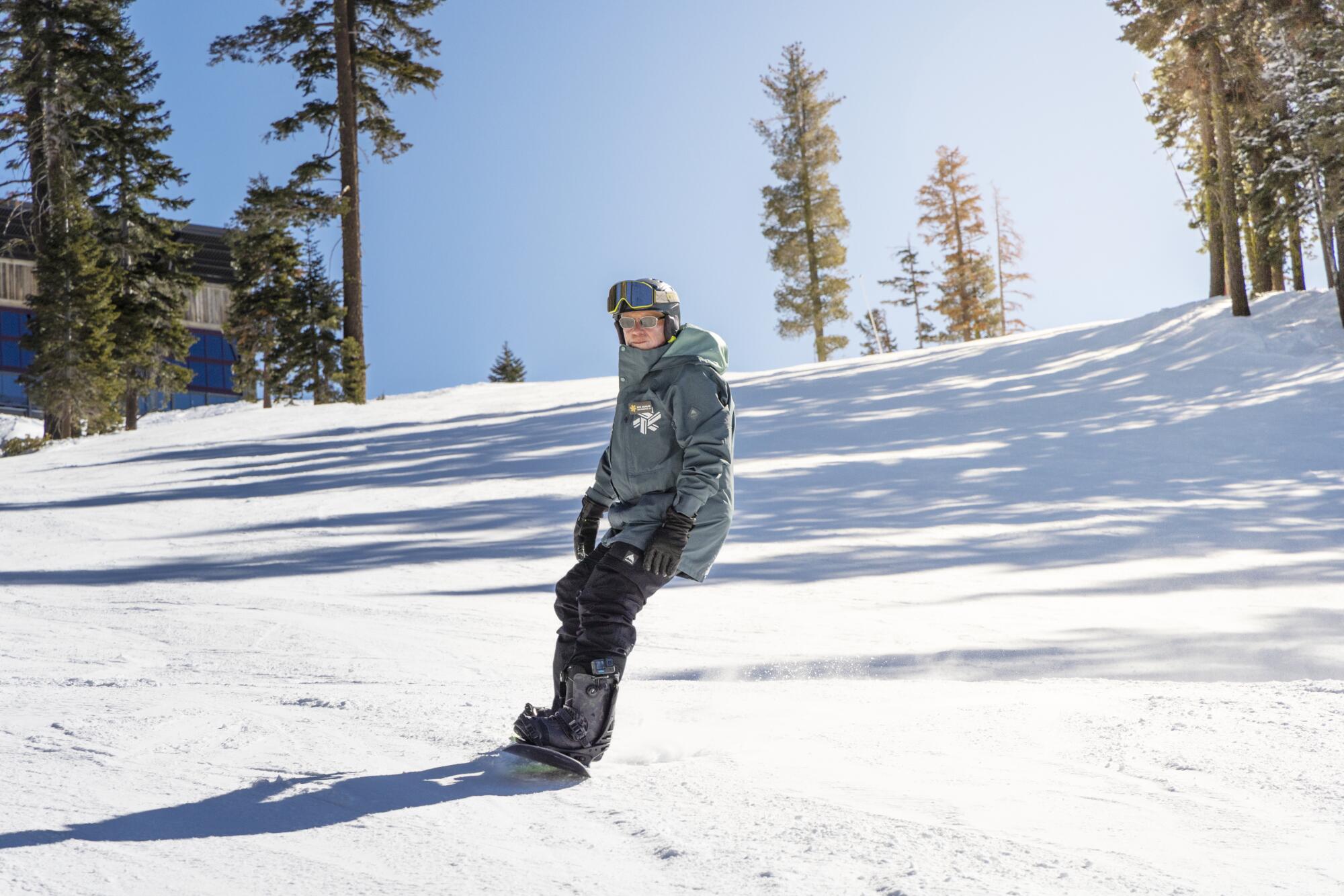
Mark Z. Barabak, who normally covers politics for a living, is an avid snowboarder who hopes someday to be as good as Dick Schulze.
More to Read
Get the latest from Mark Z. Barabak
Focusing on politics out West, from the Golden Gate to the U.S. Capitol.
You may occasionally receive promotional content from the Los Angeles Times.


